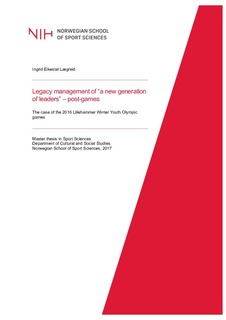| dc.contributor.author | Lægreid, Ingrid Eikestøl | |
| dc.date.accessioned | 2017-06-28T09:30:23Z | |
| dc.date.available | 2017-06-28T09:30:23Z | |
| dc.date.issued | 2017 | |
| dc.identifier.uri | http://hdl.handle.net/11250/2447141 | |
| dc.description | Masteroppgave - Norges idrettshøgskole, 2017 | nb_NO |
| dc.description.abstract | Research question: While sport politicians form ambitious legacies to justify the hosting of a large a sporting event, the legacy implementers often experience difficulty achieving this stated legacy due to the institutionalisation of the concept and the processes behind it. This study will examine the post-event phase of the 2016 Lillehammer Winter Youth Olympic Games (YOG2016), and discover what hinders the stated legacy “new generation of leaders” to be achieved through the conduction of interviews with legacy implementers. The research question is; What institutional processes may hinder the achievement of the formulated legacy “new generation of leaders” examining YOG2016 post-games? Research methods: Qualitative data were generated from semi-structured interviews with employees from the administration of seven different regional confederations under the the Norwegian Olympic and Paralympic Committee and Confederation of Sports (NIF). The participants included in this study had responsibilities within the arena of youth sports. | nb_NO |
| dc.language.iso | eng | nb_NO |
| dc.subject | arrangementer | nb_NO |
| dc.subject | ungdom | nb_NO |
| dc.subject | olympiske leker | nb_NO |
| dc.subject | strategier | nb_NO |
| dc.subject | ledelse | nb_NO |
| dc.subject | nih | nb_NO |
| dc.subject | masteroppgaver | nb_NO |
| dc.title | Legacy management of "a new generation of leaders" - post-games: the case of the 2016 Lillehammer Winter Youth Olympic games | nb_NO |
| dc.type | Master thesis | nb_NO |
| dc.description.localcode | Seksjon for kultur og samfunn / Department of Cultural and Social Studies | nb_NO |
